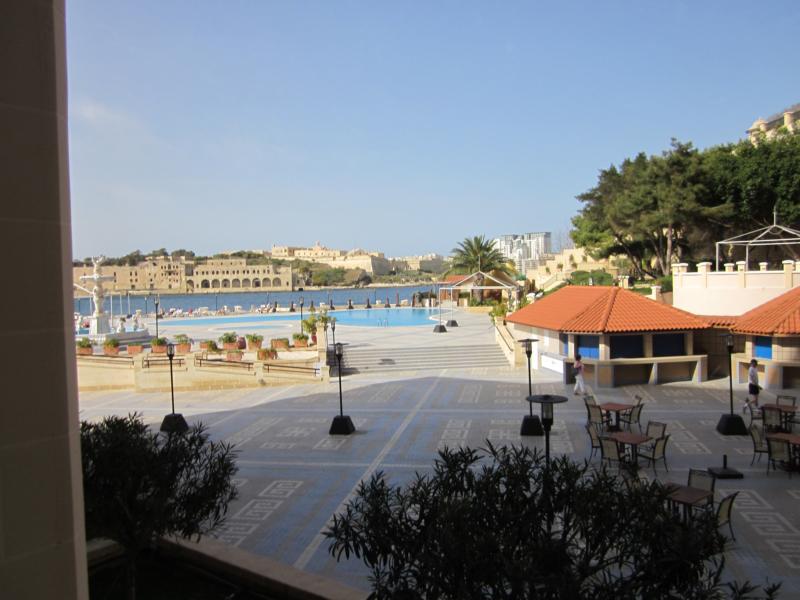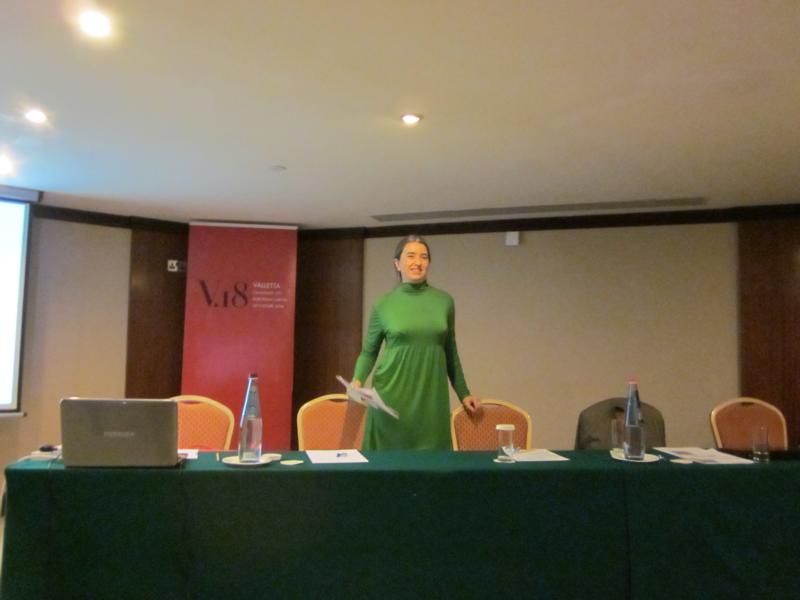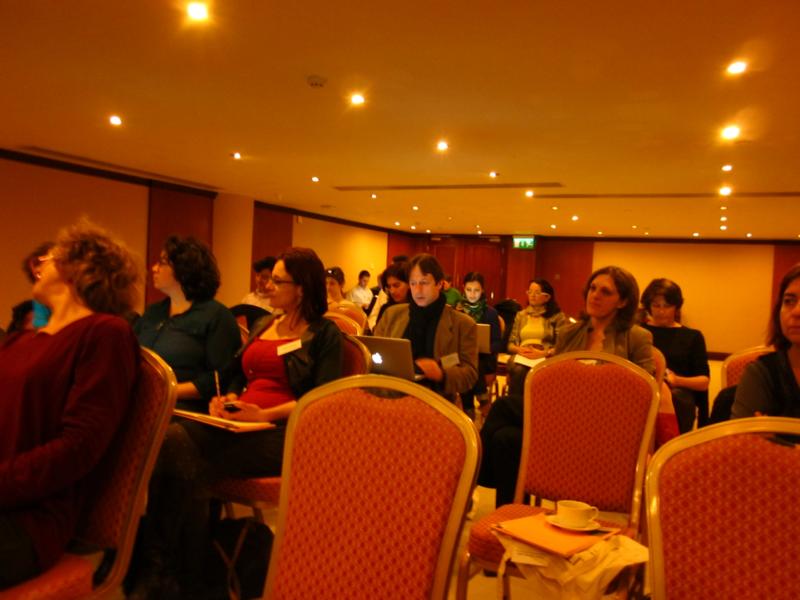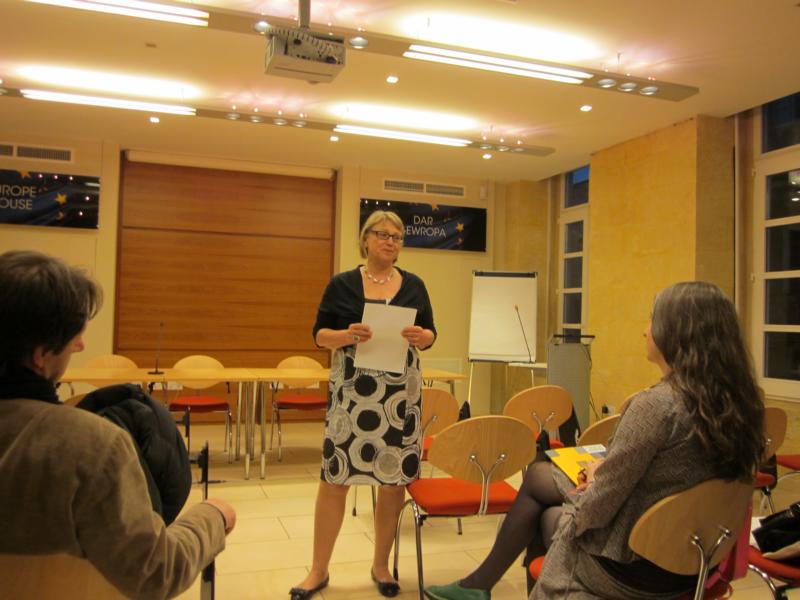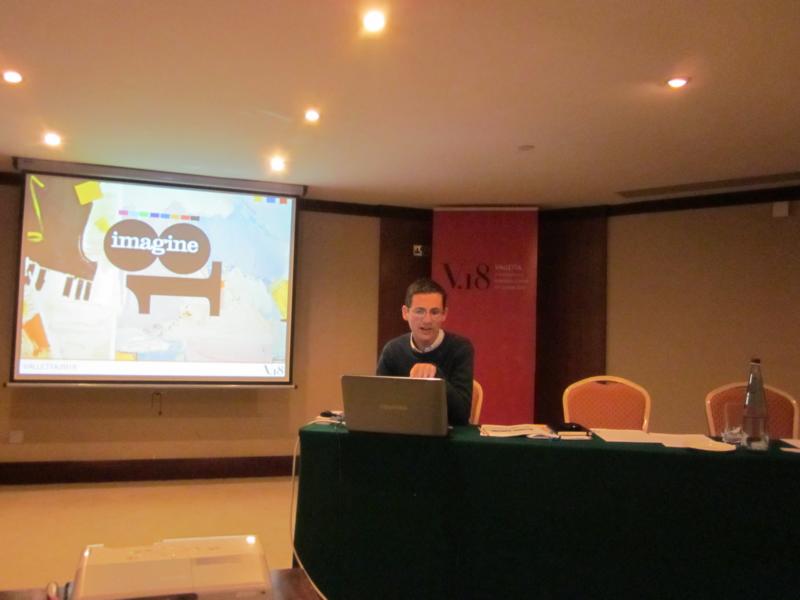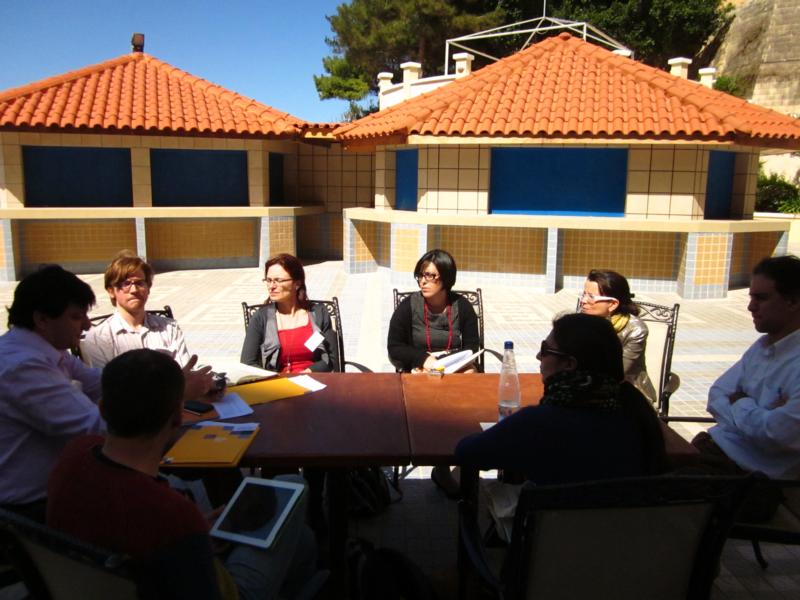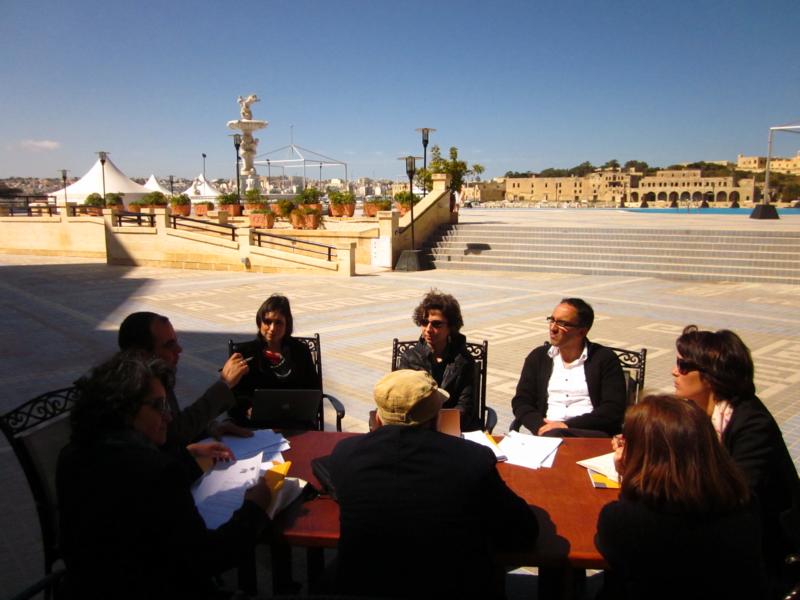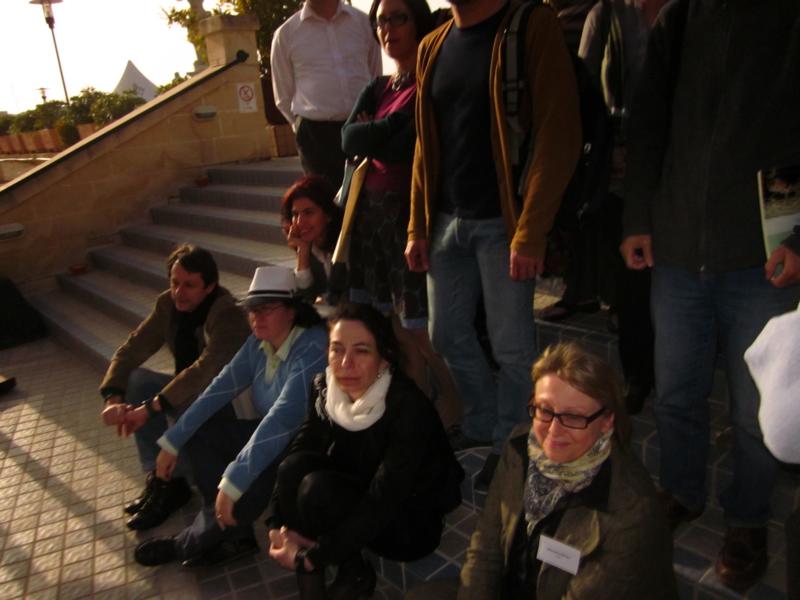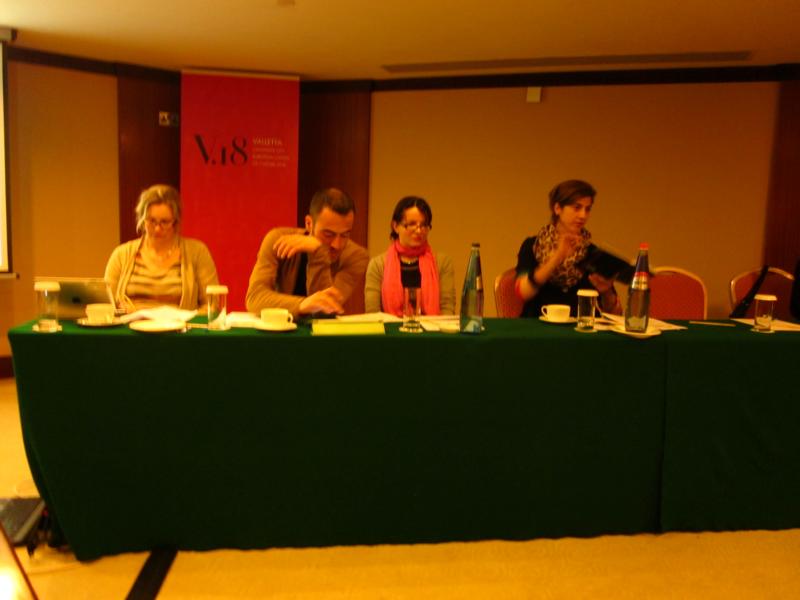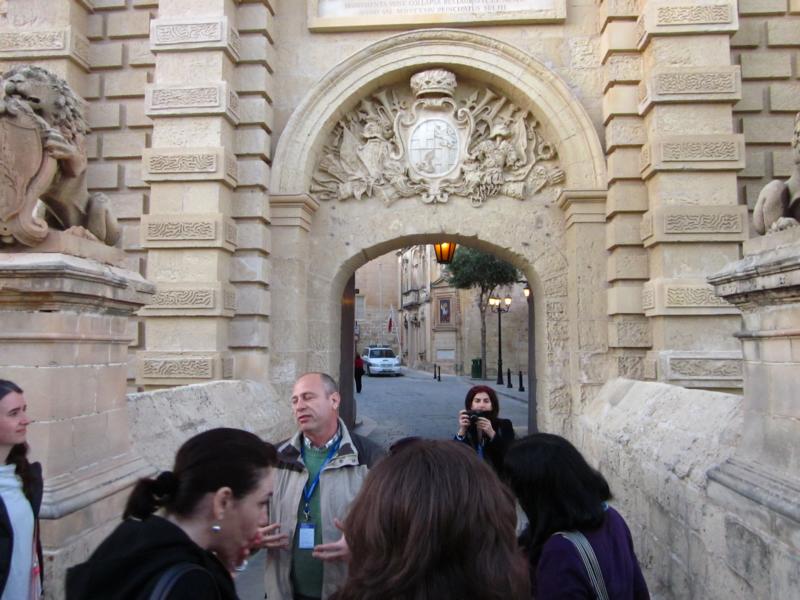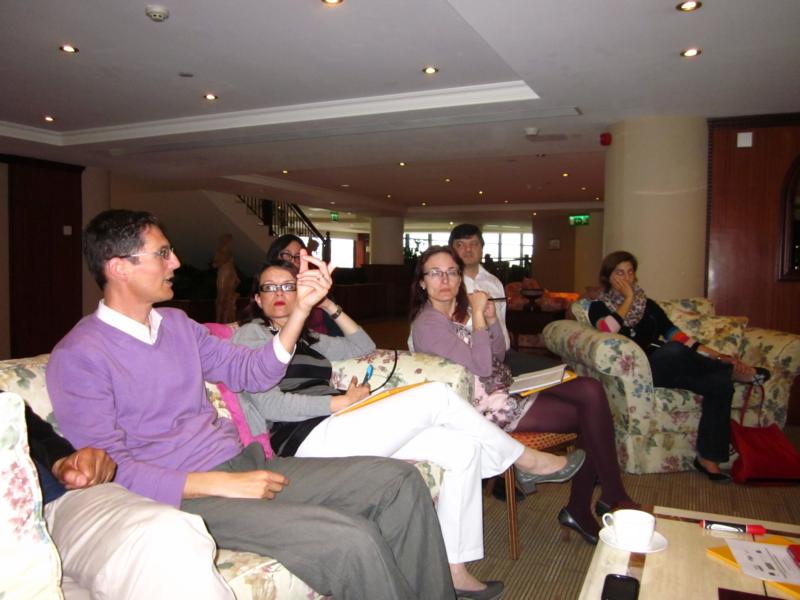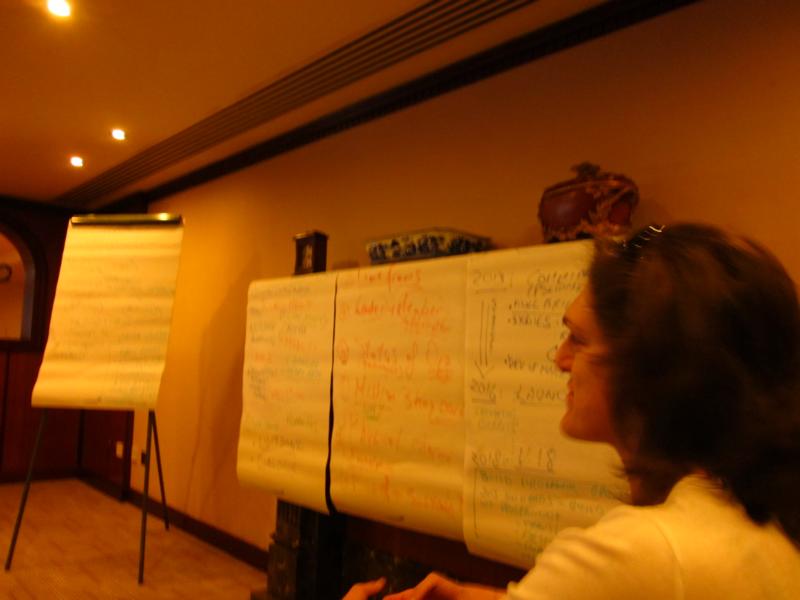Towards a strategy for Literary Exchange and Translation in the Euro-Mediterranean Region in Valletta, Malta 4 - 7 April 2013

Participants of the conference
CONFERENCE PROGRAMME
4--‐7 April 2013
See also
Thursday, 4th April
Arrivals
All participants from abroad stayed at Grand Excelsior Hotel, Valetta, Malta since it had provided favourable conditions. Still, it was a surprise for some that they had to make a safety deposit of 150 Euros. The explanation at the front desk was that this was a kind of insurance to cover if anything was used from the refrigerator or else something in the room was damaged.
View of swimming possibilities at Grand Excelsior Hotel
A first walk from the hotel into Valletta meant observing one grand hotel which can make one wonder what were the colonial times like when Malta was a part of the British empire. At first confusing, but already noticed upon arrival, when crossing the street was that all traffic is on the wrong or British side, i.e. left side. Watch left, not right! The road intersections are mainly round abouts. And then once past this main square, the entry point is now an imaginary one. For the ancient gate has been torn down to make place for a new Parliament building. The latter has sparked a controversy since Valletta altogether is a world heritage site.
1900
Opening of the conference with reception hosted by Dar-l Europa and Valletta
During that first evening Niki Marango, poetess from Cyprus, was honored since she was recently killed in a car accident while traveling in Egypt. She was well known to everyone of the LAF group. In Cyprus she had kept a lively bookshop. One special poem of hers called 'No Man's Land' touches upon what constitutes the dividing line in Cyprus, and ressonates as well with what Klaus Heinrich stated in his lecture about Sophocles' Antigone, namely to be stranded in 'no man's land' means to be in a place identical with being buried alive, or rather a place where no one is dead, but also not alive. *
Friday, 5th April
09.00–09.15
Welcome and formal opening of the conference by Alice Guthrie on behalf of Literature Across Frontiers, Inizjamed and the organizing team.
Alice Guthrie
She explained at first that Literature Across Frontiers has a solid background and extensive experience in promoting literary exchange and translation in the Euro-Mediterranean region. The current project is seeking a way of encouraging intercultural dialogue between Europe and the South-East Mediterranean. Thus a key element in LAF's commitment to improving all aspects of translation and literary exchange in the region is the development of a clear strategy built on a foundation of extensive research and broad multilateral consultation.
Alice pointed out that the conference is a part of this exciting strategy development work for literary exchange which LAF has been engaged in over various stages of this project. There are now over 170 persons who have had direct involvement in the consultation process, and as a result there are many many ripples, with several new partnerships and collaborations moving in brilliant and unexpected directions.
Many had joined already at the LAF tenth anniversary conference in May 2011, in Istanbul, and which was entitled: Literary Exchange and Translation in the Euro-Mediterranean Region: Challenges of the Next Decade. Others were participants in the two consultation workshops that the recommendations of that conference resulted in: Beirut, in July 2012, and Istanbul, in October 2011. And others participated very recently when preparing the final meeting of this consultation project in Valletta, Malta, and during which inspiring plans for concrete action were made.
She shall be updating all on further developments as they happen, of course, but for now she wants to just share with all the wordpress site which covers this concluding event in Malta. There can be seen video interviews with a range of participants in several languages, browse images and read the guest blog from the event.
Alice Guthrie
Plenary session
1: Setting the themes for discussion and outlining the current situation
The plenary session will present an overview of the current situation, with reference to cultural policies, socio--‐economic and political factors and responses of the independent cultural sector on the one hand and government policy--‐makers in terms of cultural and foreign policies on the other.
Part 1
0915–1045
Cultural policies and the role of the independent arts and culture sector
Introduction
Luca Bergamo: overview of the role of the independent arts and culture sector in Europe as an interlocutor with national and EU policymakers and funders.
Luca Bergamo
Since Ilona Kish left Culture Action Europe, it was interesting to hear the new approach adopted by her successor, namely Luca Bergamo. While Ilona was a practioner coming from the managerial side, Luca seems to prefer a much more theoretical and conceptual approach, in order to improve the strategy of Culture Action Europe. Rightly so he stresses the future is bleaque with regards to finances for culture. Consequently Culture Action Europe must reach out to a much wider group of supporters and even go beyond the traditional or modern cultural sector, insofar as citizens have to be included. He dealt analytically with the situation to be faced and underlined that positioning of Culture Action Europe is a matter of locating precisely the pertinent quesitions within the overall European context. His new approach was underlined by pointing out the demographic shift occuring in Europe with societies growing old. He concluded his presentation with a need for a new narrative about Europe.
As a first comment, it might have become recently the buzz word in Brussels, namely to find the overall narrative, but iust as the debate shows about the novel still being possible in the 21st century, there has to be asked if stories told and literature (poetry) being written these days are still in tune with what is happening in Brussels? Rather it appears that Brussels has become a sad place and especially culture has not been treated well since 1999/2000 despite many efforts to alter the agenda of Europe to include culture.
Also between these two poles, demographic shifts and search for the narrative, new fields of reflections have altered dispositions. Nowadays it seems as if history has been replaced by memory studies while dialogue between cultures does differ from dialogue between generations. Belfast might be an example of how vital is trust in stories told, for they have to be honest enough to entail sigs of redemption between victims and perpedrators. At a conference 'culture makes history' held in Berlin and organized by the Political Cultural Society, a historian would ask how come a grandson could tell a story about his grandfather that makes him into a resistent fighter during National Socialism when in fact he was a member of the SS?
Transferred to Europe, there is a need to examine what is being passed on from generation to generation, especially since the peace needed after 1945 serves as prime legitimacy of the European Union with the Polish foreign minister praising the open border his country has with Germany, something unthinkable when remembering what was the situation 1939-45!
While listening to Luca Bergamo's reflections, I wondered if he could explain with this approach as to why Europe risks to become stagnant despite all the illusions created by the European Commission with its 2020 vision of Europe becoming a modern and dynamic continent. That promise was also already evident in the Lisbon vision of making out of Europe a knowledge society which could supersede the United States. Rather Europe has hit a snag. Aside from recessions in many member states due to austerity measures imposed by the Troika, there is a growing sense that the institutions of the EU are rapidly losing in legitimacy. The EU Parliament is a prime example of having been sidelined during the economic crisis.
All this is mentioned because the economic crisis spells out as well a huge loss of culture. When probability calculations are used to create a statistical basis for the extent of budgetary deficits, then this is way beyond the intellectual horizon of the common citizen. It would require a cultural bridging between reality and the economic data, if people are to understand in which situation they are living in. That is, however, more than a narrative and would require in a honest form such kind of communication which would give those on the outside a better insight into what is going on in Brussels.
About decisions taken within the Troika, Herman Van Rompuy would offer to his critic Jürgen Habermas that finding decisions at EU level may be a pain staking process, but certainly it is a way forward. Habermas himself delivered in Leuven on April 26 a lecture in which he stressed again the need to bridge the gulf between EU institutions and citizens. Internal procedures and a critical understanding given from the outside are keys for transparency, but it might be not enough to bridge the gap. For there prevails as well an anti-Europe sentiment which is equivalent to an anti-politics as a general feeling since people are not interested in scandals but would like to be sure the political process is honest and accountable. It would mean politics unfolds through lively discussions and good questions fortthcoming are deliberated upon in earnest. That would require an active feedback practice for otherwise those disappointed by fruitless debates leading to nowhere except perhaps to the commissioning of still further and other studies.
Thus a key to explanations as to why deliberations are no longer open ended, since everything is dealt with has been reduced to the already known, then Europe is definitely no longer an open ended process. So why should the narrative continue? If there has to be an outcome secured, even if it means in most cases of European projects just another 'Good Practice' or 'Best Practice' report, then it sidesteps the much more crucial question, but does it allow the people of Europe live in dignity? If there are 27% unemployed in Spain, and like in Greece over 50% of the youth, that is hardly a way into the future. Rather it seems inexperience with regards to real policy application misguides the entire process to still further waste of funds while not rectifying the entire situation any time soon.
The fact that many EU politicians and experts use the same jargons, and as a mask to hide their lack of comprehension of politics, means a complex decision making process is no longer experienced and enjoyed, but becomes itself a pains taking process. That is further underlined by the fact that many cultural operators turn only to the European Commission. It leaves aside the European Parliament and even more so the wider audience of European citizens. No wonder then when European debates risk to become truly stagnant.
The economic crisis has hieved into decision making power such entities as the Troika which has no legitimacy but which can dictate the policy of the EU member states to a point that they can be ordered to commit suicide and the amazing thing is they do it, even if austerity measures means ruining the lives of thousands, if not millions of people. Quite another disaster scenario is sweeping Europe but all that is still hidden in a pretense as if endless growth based on technological innovation is possible. In that sense, it seems that a precise location for discussing truly cultural policy at European level has still to be found, and that means the reproduction of the same arguments leading to this stagnant situation have not been countered so far.
Note: In the latest newsletter from Culture Action Europe, it is noted that "you’ll find the second 2013 ‘hot off the virtual press’ newsletter of the Europe-wide arts advocacy campaign we are more – act for culture in Europe, launched by Culture Action Europe in strategic partnership with the European Cultural Foundation." (3.6.2013) The critical question whether this campaign has succeeded to help cultural operators and artists confront the difficulties linked to budget cuts for culture? It is doubtful since culture has lost in voice at the overall negotiation table with regards to the 2014-2020 spending period.
The real question is if Luca Bergamo can communicate well enough his theoretical position, so that the approach he advocates is understood by all actors. His approach does contain the potential to supersede the usual rhetorical frame of references when cultural experts talk with official policy makers of the European Commission. His effectiveness as coordinator will depend upon getting other cultural operators to enter such a theoretical debate and reflection. That he comes from Italy may explain his lucid handling of difficult theoretical concepts and at least the choice of images he uses to illustrate his points suggests wit and humour. If it helps to bring negotiation of culture out of the shade being cast by own expectations not much can be done, that remains to be seen.
A sample of his use of images about negotiation tactics
Basma El Husseiny: overview of cultural policy trends, developments, potential and debates in the Arab world, especially the South Med region.
Basma El Husseiny
The voices of the Arab world are quivering in 2013. Much uncertainty surrounds everyone and everything due to unfolding events. Egypt's President Morsi has risked to use a heavy hand. Revolts against his rule recede like waves, in order to gather new strength and to return with the next gush of wind. Tourism is down. Between these two parameters, tourism and military expenditure, the Egyptian economy slidders along a dangerous course. Thus when ideas are elaborated upon on how to find a way out of this uncertainty, then often the answer is more as search as to who can be trusted. That search encompasses what kind of dialogue can take place with Europe, more specifically with the European Union. Too often for those coming from these countries the diologue with official representations is more important since linked to power structures than what would filfil the real need for dialogue. Definitely by listening to her and other voices of the Arab world, it has to be realized that there is a growing difference between how Europe is perceived as continent by those living in the Arab world and how the European Union is perceived internally by Europeans. If dialogue could guide those who work within the confinements of certain institutions with those involved in all kinds of cultural networks, then perhaps a certain effort towards common goals could bring about something.
Here needs to be added that the conference in Malta made possible a reflection of these existing differences. Since Basma El Husseiny has tremendous experiences as to what is happening inside of Egypt, she can provide a much more differentiated viewpoint about what is happening especially with regards to the constitution and what shall determine the legality of all governmental actions. Equally as UNESCO expert in cultural governance she can make a sound assessment as to what is happening to the dialogue with the EU.
She is co-author of the EU Report: Towards a Strategy for Culture in the Mediterranean. See:
Tsveta Andreeva: overview of cultural policy trends and debates in Europe regarding the role of culture in EU foreign relations.
Tsveta Andreeva
Tsveta Andreeva comes from Eastern Europe and works for the European Culture Foundation in Amsterdam, and there as policy officer for the Advocacy and Research & Development section. She did her PhD in Cultural Economics in Sofia and before departing for Amsterdam in 2009, she worked as chief expert in European affairs and international cultural policy at the Bulgarian Ministry of Culture. Naturally her presence raises the question but what is the precise nature of the policy persued by this foundation? For without doubt the ECF has a strong influence upon all proceedings having to do with culture at EU level? One possible answer is that its financial independence and policy orientation allows the Foundation to give readily support to not only Culture Action Europe, but also to such undertakings as the Platform for Intercultural Dialogue e.g. by pre-financing certain phases until the money from the EU would arrive. That means in all these cultural lobby groups in Brussels the Foundation has a direct and out of proportional influence. Despite the claim of independence, the Foundation has nevertheless as figure head a link to the Royalty of Holland and therefore would need to explain more what is all behind its efforts. Its tools to influence cultural developments range from direct grants to giving prizes for best cultural researcher in the year. Over the years this influence has made itself felt as the Foundation is a major player whenever it comes to negotiations with the European Commission about cultural matters. No other single actor has perceived so well the growing importance of culture and understood to promote a different kind of mediation between local, national, European and international levels than the ECF in Amsterdam.
Link: European Cultural Foundation.
Moderator of Q & A session: Caldon Mercieca
Caldon Mercieca works for the Ministry of Finance and there is in charge for the promotion of the Cultural and Creative Industries in Malta as this has become a high priority within the overall National Policy Programme.
Participants ready to pose questions and to reflect upon given answers
1045– 1115 COFFEE
Part 2
1115 – 1245
Literary exchange and translation in the Euro--‐Med region – towards a strategy
Alexandra Büchler: summary of relevant initiatives and documents to date, as well as LAF’s two--‐year consultation process leading up to this workshop and TLHub as possible part of the virtual hub.
Alexandra Büchler
Karsten Xuereb: presentation of the Valetta 18 plan and the relevance of the LAF--‐Inizjamed initiative in the context of ongoing work on Valletta’s successful bid to be the Capital of Culture 2018 (V18).
Karsten Xuereb
A funny thing happened when Karsten Xuereb mentioned that Valletta is thinking first of all about the year 2017 when Malta will have the EU Presidency, and then about 2018 when Valletta shall be European Capital of Culture, but while this planning horizon sets already some clear targets, they are also thinking about 2030 when it shall be again the turn of Malta to name one city to be European Capital of Culture. As he said that, there was a grasping for air in the audience. With many among them caring more about day to day ways of surviving, alone reference to such a time framework makes them realize they may not even be living by then. Yet the ability to think ahead and to anticipate what is to come in future makes all the difference to being practical ahead of time.
More concrete was the lay-out for Valletta 2018 when revealing a chart of all the distinct functions and features in need to be taking care of, with the Lit Hub just one of the many projects envisioned but still one of the most important ones since they shall wish to secure the legacy of V18 by having established such a literature and translation centre.
Valletta: Strategy Map for 2018
Moderator: Elin Haf Jones
Elin Haf Gruffydd Jones
She is director of the Mercator Institute for Media, Languages and Culture and Senior Lecturer in Media and Creative Industries at the Department of Theatre, Film and Television Studies at Aberystwyth University, Wales. Knowledgeable in several languages (Welsh, English, Spanish, French, Galician, Catalan, Italian and Basque), she has co-edited most recently with Enrique Uribe Jongbloed, Social Media and Minority Languages: Convergence and Creative Industries (published by Multilingual Matters in Feb. 2013).
-
open Q&A
Karma Sami and Fatima Sharafeddine
Dr. Karma Sami is writer, critic, and Professor of English Literature in the faculty of al Alsun (Languages), Ain Shams University, Cairo, Egypt. She did her Masters about Harold Pinter's plays (1990) while in her Ph.D. she dealt with "Female Archetypes in Arnold Wesker's One-Woman Plays". (1994) She is currently Editor in chief of Al Alsun Tarjama Magazine, and managing editor of two academic journals: Sahifatul Alsun and Philology.
Fatima Sharafeddine is an accomplished author of children and young adult books.
1300 –1400 LUNCH

View from the hotel's restaurant
1400 – 1530
Group Sessions
1: Addressing key topics
5 groups running in parallel; each group has a moderator and rapporteur who later sum up for the plenary. They all gathered outside. Note: not all photos of the group sessions which took place seperately correspond exactly with the topics 1 - 5.
a) Literary and translation policy as part of wider cultural policy and mainstreaming of culture
While literature and translation are still mostly treated as a separate sector at national level, policy--‐making and funding at transnational and EU level favours the non--‐sectoral approach – is this a limitation or an opportunity? Is the voice of our sector sufficiently heard and is it represented in relevant structures? What can we learn from other sectors in terms of effective lobbying? Where does our sector fit in the current policies and support structures? What is missing in terms of infrastructures at all levels? What has been the impact of the financial crisis and of the political turmoil in the South – what opportunities and threats?
b) Mobility of people and work
Mobility is key to cultural cooperation between Europe and the South--‐East Mediterranean. Morning speakers would have touched on the current state of mobility in terms of support, resources and information provision, and visa barriers. How can we overcome the barriers to North--‐South mobility of both people and work? How can we address the problems of gate-keeping of mobility opportunities? Should we also consider other issues such as the environmental impact of mobility? What are the opportunities offered by new technology and how can we harness virtual mobility possibilities?
c) The role of culture in EU external relations
The recognition of the role of culture in external relations has grown in recent years and individual states as well as the EU have increasingly used the soft-power of cultural relations to further their political and economic aims. How does this meet the real needs of the independent cultural sector and to what extent, if at all, are cultural organisations allowed to contribute to the external relations debate and related policy‐making and benefit from opportunities offered by the shifting political and economic agendas of national governments and the EU? What paradigms can we identify and learn from in terms of civil society‐led initiatives and citizen media examples? Is unpaid voluntary work the future for the culture sector or should we lobby for the opposite – professionalization and proper recognition of the contribution of civil society, and efficient synergies between the government and independent cultural sector?
d) Establishing a hub for Euro-Med literary exchange and cooperation
Recent initiatives by various actors and stakeholders have emphasized the need for effective points of communication and resources, as well as the need to build on existing initiatives and resources and the role of networking in achieving this. Establishing a hub for communication and literary cooperation in the Euro-Med region has been one of the recommendations coming out of the consultative meetings organised by LAF over the past two years, both in terms of an innovative interconnecting of existing groups, networks and initiatives, using digital technology and social networking methods, as well as a physical facility possibly located in Malta?
e) Between the global and the local
How can local, grassroots initiatives be connected to global ones? How can local governments best support international cultural activities that can benefit local groups and communities? What has been the legacy of the European Capitals of Culture and how can we ensure that culture spearheads socio‐economic development and regeneration, especially at a time of the near collapse of economies and socio-political structures in the South, and savage budget cuts that have affected core cultural infrastructures around Europe?
1530 –1600 COFFEE
After the group photo was taken, not all dispersed immediately but lingered on or stayed put by sitting on the stairs. Some like Adrian Grima look up in the air, others intensively into the one addressing them. There is poetry in the air. The people started to grow together as the conference went on and new linkages between South and North was made. It was a search for and a debate about Europe and the Mediterranean region. If anything, it meant LAF brought some exceptionally good people together and therefore a lit-hub was already being shaped.
1600 – 1730
Plenary Session
Summary of the day’s discussions by moderators and rapporteurs
Summary of the day’s discussions and explanation of tasks for Day
Panel reporting
Moderator: Dan Gorman
Social Programme: Mdina by night
1830 departure from hotel for Mdina (1.15 hour guided walk around Mdina from 1900)
Guide
Entrance to Mdina
The guide explained the history of Mdina linked to St. Paul who ended up in Malta due to shipwreck. There was first the influence of the French, and then of the British. Mdina as a cultural heritage place is located on the highest point of the island and therefore was used to safeguard its inhabitants. Later on it became a preferred place of residence. Naturally the colonial times left a deep imprint on Maltese people. It included the British crown sending Irish troops since they were Catholic and expected to get along better with the local population deeply devout Catholics. The Irish wanted to have two things, beer and butter, and therefore started an own agriculture which had never existed before on the island. As to the influence of various rulers and dictates, all that can be read from the architectural features. It was a most interesting walk with many taking photos alone of the different doors. There was as well a narrow Greek street. Much was build to keep out not only potential enemies but as well the wind and the sun. Today Mdina is partly owned by its mayor and partly by a noble family. It is a famous tourist destination and yet proves to be a most difficult place to uphold for various reasons. Life in such a city is not at all easy for the proportionality with here an urban environment and outside the walls a wild nature no longer holding in the 21st century marked by tourism and loss of wild places.
2030 Dinner at Xara Palace, Mdina
For the time of the year it was coolish to sit outside even though in a tent like construction with gas stoves spending heat.
Saturday, 6thApril
0930 – 1100
Group sessions 2: Addressing key topics
Same topics as previous day (see a,b,c,d & e above) are discussed by different groups, moderators and rapporteurs to ensure diversity of inputs.
1100 – 1130 COFFEE
1130 – 1300
Plenary session 3: reporting on key strategic points around each topic, and formulation of a statement
Moderators:
Elin Haf Jones and Albert Gatt
Moderators and rapporteurs report on the outcomes of group discussions with emphasis on any agreements, disagreements or additional points, and on strategic issues.
Elizabeth Gretch
She is from Malta but lives in Paris and hence belongs to the Maltese diaspora. In Paris she works as executive project manager for the Fondation Rene Seydoux. She studied ethnology at the University of Malta and Aix Marseille I and became a translator of Maltese poets such as Adrian Grima, Antoine Cassar, John Portelli, Clare Azzoppardi into French. She has been editor in chief of the English version of the independent online magazine on Mediterranean cultures and societies Babelmed.net for the last three years.
1300 – 1400 LUNCH
1400 – 1530
Group sessions 3: Developing a strategy and roadmap
Three parallel groups draw on previous sessions and conclusions to establish the main points towards a first
draft of three documents on the following topics:
Strand 1 Euro--‐Med Literary Strategy Working Group
– identifying and planning areas of action and concrete achievable goals based on the points raised in the plenaries so far, how to address them and in what arena, with what support and in what partnerships.
Document dissemination plan.
Moderator: Basma el Husseiny
Strand 2 Euro--‐Med Literary Hub (physical)
– Malta Euro--‐Med Literature House as part of the Valetta Capital of Culture plan. What models and best practices can the hub follow? Governance, mission, logistics, management, operation, funding. What are the roles of other NGOs in relation to the hub, what sorts of activities should it support and accommodate?
Relationship between the virtual and physical hub.
Moderator: Caldon Mercieca
|
|
|
|
|
|
|
Caldon Mercieca was not only an excellent moderator, but he made the workshop become more systematic as different topics unfolded. |
Karsten Xuereb explaining the points he would like to see being realized with such a Lit-Hub in combination with music. |
|
|
A Lit-Hub is a complex entity and a lot of thoughts need to go into it before it can take on concrete shape. Few people realize afterwards what work this entails. But it shows with what careful preparation procedure Valletta starts out on to realize a legacy linked to imagine 18. |
In this particular session a lot of good proposals were made, or rather factors in need to be taken into consideration named. It is clear that Malta offers a unique location for such a lit-hub. Alone this conference provided evidence of how important it is to listen to different voices. Naturally literature and translation are not easily combined with poetry still another area. In many cases, publishers follow common trends e.g. in Germany only then something is translated and published in German if it has been already a success on the English book market. It seems that a combination of factors are involved in the decision to translate this work and not another even though for mutual understanding, it would be crucial to ensure aside from market based decisions still other venues and priorities would influence the building of more cultural bridges. Yet while it might be the task of the European Commission to ensure lesser spoken languages are considered, there applies as well the caution of Habermas who mentioned once methods are adopted to correct injustices, one has to be careful that they do not become in turn discriminatory.
Strand 3 Euro--‐Med Literary Hub (virtual)
– How can we best utilize and build on existing resources: LAF website, Tlhub, FRS database, Babelmed, etc. What models and best practices can the hub follow? Governance, mission, logistics, management, operation, funding. What are the roles of other NGOs in relation to the hub, what sorts of activities should it support, what kind of information should it provide, how can it act as a networking tool?
Relationship between the virtual and physical hub.
Moderator: Dan Gorman
Panel reporting
1530 – 1600 COFFEE
1600 – 1700
Plenary session 4: Summing up the outcomes of the conference and closing remarks
1700 – 1730
Virtual media promotion of event and outcomes
Video interviews, blogging, tweeting and social media posts by journalists and participants in various languages.
Glen Calleja - Cultural Contact Point of Malta
Dan Gorman Reporting about the conference
Social programme
Leave hotel at 19:00
Dinner at Pintonino Restaurant, Valletta Waterfront
Waterfront promenade
|
|
|
|
|
|
|
The last evening a dinner at a restaurant located at the sea promenade. As always hardly have these conferences started and already it is time to depart. Some sadness can overcome one. Newly gained friends and old acquaintences brought together especially at a new location like Valletta and Malta make it hard to imagine when it will be possible to meet again. LAF was sitll not sure about how funding will continue. They need to secure a new EU financed program to make meetings like these possible. Still, there is the promising horizon of Valletta 2018. |
|
Sunday, 7thApril
Optional sightseeing and departures
The organisers acknowledge the kind support of the European representation in Malta, Dar l--‐Europa,
The Malta EU Culture Contact Point, The Valletta 2018 Foundation, and the Rene Seydoux Foundation.
Accommodation and conference venue:
Grand Excelsior Hotel
http://www.excelsior.com.mt/
Contact persons:
Clare Azzopardi (Inizjamed)
Claudia Gauchi (Inizjamed)
Alexandra Büchler (LAF)
Photos and text by Hatto Fischer (10.6.2013)
Links:
Further reports about the conference at http://euromedlit.wordpress.com/
* Niki Marangou was also honoured at a special event in Berlin. Organised by Literatur Werkstatt on 28.5.2013, it showed what she leaves behind, especially when death is sudden, unexpected and an accident which does not allow her to translate her dreams anymore into poetry.
-Außer Haus-
Di 28.5. 18:00
Europa literarisch: Zypern
Moderation: Thomas Wohlfahrt (Literaturwerkstatt Berlin)
Die Schriftstellerin und Malerin Niki Marangou (*1948, Limassol, Zypern; †2013) ist am 7. Februar diesen Jahres bei einem Autounfall in der ägyptischen Stadt al-Fayyūm ums Leben gekommen. In einer Veranstaltung ihr zu Ehren würdigen wir das Leben und das Werk der Künstlerin.
Die griechische Sprache, die antike und die zeitgenössische, stand nach eigenen Auskünften seit jeher im Zentrum von Niki Marangous Schaffen. Für ihr umfangreiches schriftstellerisches Werk – sie hat Gedichte, Prosa und Kinderbücher geschrieben – wurde sie mit zahlreichen Preisen ausgezeichnet. So erhielt sie im Jahre 1998 den Konstantin-Kavafis-Preis für Lyrik, 2006 zeichnete sie die Akademie von Athen für ihr Buch »Divan« aus, 2007 hat die Literaturzeitschrift »Diavaso Rewards« ihr Buch »The Demon of Lust« in die Liste der zehn besten griechischen Kurzgeschichtensammlungen des Jahres aufgenommen. Ihr malerisches und druckgrafisches Werk ist weltweit ausgestellt worden.
Niki Marangou studierte 1965–1970 Soziologie in West-Berlin. Zehn Jahre lang arbeitete sie als Dramaturgin am Staatstheater Zypern. In Nikosia leitete sie seit 1980 die Buchhandlung Kochlias.
Sie war Mitglied der Gesellschaft Griechischer Autoren und gehörte dem Vorstand des zypriotischen PEN-Clubs an.
Von Marangou sind folgende Werke in deutscher Übersetzung erschienen: »Und sie feierten Hochzeit vierzig Tage und vierzig Nächte lang: Märchen aus Zypern« (Romiosini 2001) und »Von Famagusta nach Wien: Die Geschichte eines Arztes aus Zypern« (Kitab 2007).
Ort: Vertretung der Europäischen Kommission in Deutschland, Unter den Linden 78, 10117 Berlin
Eintritt frei, kein Nacheinlass
Um Anmeldung wird gebeten bis zum 24.5. unter: http://bit.ly/ZgPH7X
Eine gemeinsame Veranstaltung der Vertretung der Europäischen Kommission in Deutschland und der European Union National Institutes for Culture (EUNIC) in Kooperation mit der Botschaft der Republik Zypern sowie der Literaturwerkstatt Berlin.
« Concept | Report by Kenza Sefrio »

